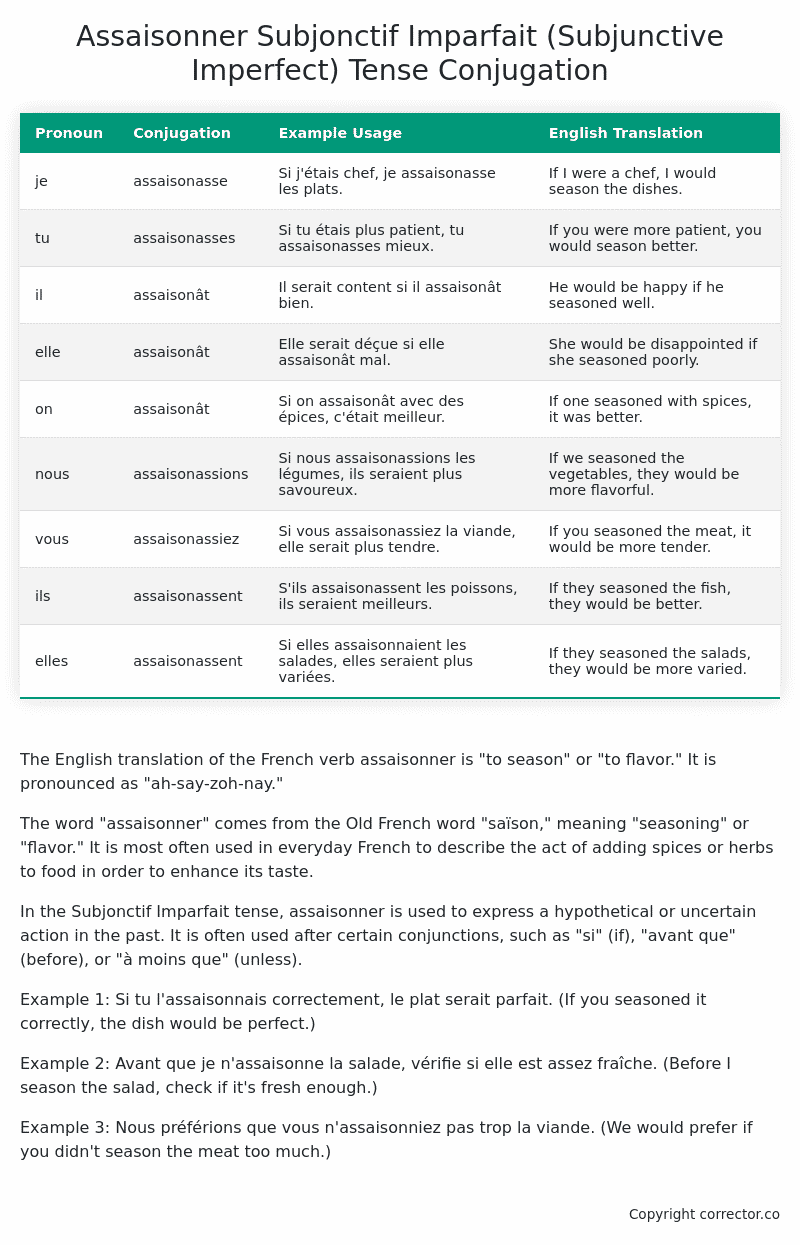Subjonctif Imparfait (Subjunctive Imperfect) Tense Conjugation of the French Verb assaisonner
Introduction to the verb assaisonner
The English translation of the French verb assaisonner is “to season” or “to flavor.” It is pronounced as “ah-say-zoh-nay.”
The word “assaisonner” comes from the Old French word “saïson,” meaning “seasoning” or “flavor.” It is most often used in everyday French to describe the act of adding spices or herbs to food in order to enhance its taste.
In the Subjonctif Imparfait tense, assaisonner is used to express a hypothetical or uncertain action in the past. It is often used after certain conjunctions, such as “si” (if), “avant que” (before), or “à moins que” (unless).
Example 1: Si tu l’assaisonnais correctement, le plat serait parfait. (If you seasoned it correctly, the dish would be perfect.)
Example 2: Avant que je n’assaisonne la salade, vérifie si elle est assez fraîche. (Before I season the salad, check if it’s fresh enough.)
Example 3: Nous préférions que vous n’assaisonniez pas trop la viande. (We would prefer if you didn’t season the meat too much.)
Table of the Subjonctif Imparfait (Subjunctive Imperfect) Tense Conjugation of assaisonner
| Pronoun | Conjugation | Example Usage | English Translation |
|---|---|---|---|
| je | assaisonasse | Si j’étais chef, je assaisonasse les plats. | If I were a chef, I would season the dishes. |
| tu | assaisonasses | Si tu étais plus patient, tu assaisonasses mieux. | If you were more patient, you would season better. |
| il | assaisonât | Il serait content si il assaisonât bien. | He would be happy if he seasoned well. |
| elle | assaisonât | Elle serait déçue si elle assaisonât mal. | She would be disappointed if she seasoned poorly. |
| on | assaisonât | Si on assaisonât avec des épices, c’était meilleur. | If one seasoned with spices, it was better. |
| nous | assaisonassions | Si nous assaisonassions les légumes, ils seraient plus savoureux. | If we seasoned the vegetables, they would be more flavorful. |
| vous | assaisonassiez | Si vous assaisonassiez la viande, elle serait plus tendre. | If you seasoned the meat, it would be more tender. |
| ils | assaisonassent | S’ils assaisonassent les poissons, ils seraient meilleurs. | If they seasoned the fish, they would be better. |
| elles | assaisonassent | Si elles assaisonnaient les salades, elles seraient plus variées. | If they seasoned the salads, they would be more varied. |
Other Conjugations for Assaisonner.
Le Present (Present Tense) Conjugation of the French Verb assaisonner
Imparfait (Imperfect) Tense Conjugation of the French Verb assaisonner
Passé Simple (Simple Past) Tense Conjugation of the French Verb assaisonner
Passé Composé (Present Perfect) Tense Conjugation of the French Verb assaisonner
Futur Simple (Simple Future) Tense Conjugation of the French Verb assaisonner
Futur Proche (Near Future) Tense Conjugation of the French Verb assaisonner
Plus-que-parfait (Pluperfect) Tense Conjugation of the French Verb assaisonner
Passé Antérieur (Past Anterior) Tense Conjugation of the French Verb assaisonner
Futur Antérieur (Future Anterior) Tense Conjugation of the French Verb assaisonner
Subjonctif Présent (Subjunctive Present) Tense Conjugation of the French Verb assaisonner
Subjonctif Passé (Subjunctive Past) Tense Conjugation of the French Verb assaisonner
Subjonctif Imparfait (Subjunctive Imperfect) Tense Conjugation of the French Verb assaisonner (this article)
Conditionnel Présent (Conditional Present) Tense Conjugation of the French Verb assaisonner
Conditionnel Passé (Conditional Past) Tense Conjugation of the French Verb assaisonner
L’impératif Présent (Imperative Present) Tense Conjugation of the French Verb assaisonner
L’infinitif Présent (Infinitive Present) Tense Conjugation of the French Verb assaisonner
Struggling with French verbs or the language in general? Why not use our free French Grammar Checker – no registration required!
Get a FREE Download Study Sheet of this Conjugation 🔥
Simply right click the image below, click “save image” and get your free reference for the assaisonner Subjonctif Imparfait tense conjugation!

Assaisonner – About the French Subjonctif Imparfait (Subjunctive Imperfect) Tense
Formation
Common Everyday Usage Patterns
Interactions with Other Tenses
Subjonctif Présent
Indicatif Passé Composé
Conditional
Conditional Perfect
Summary
I hope you enjoyed this article on the verb assaisonner. Still in a learning mood? Check out another TOTALLY random French verb conjugation!


